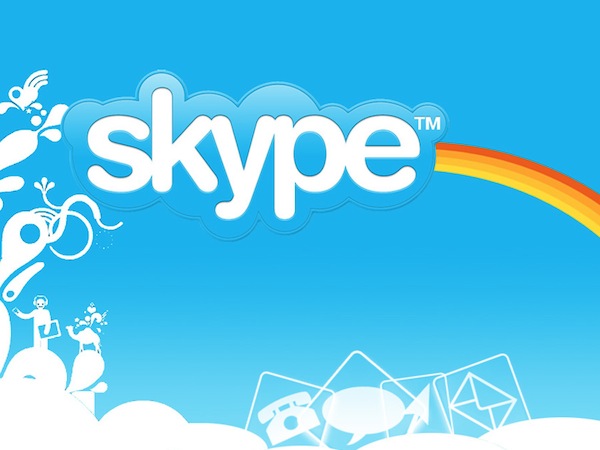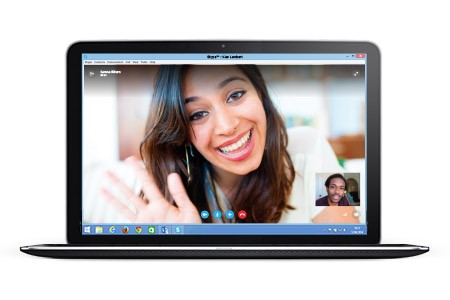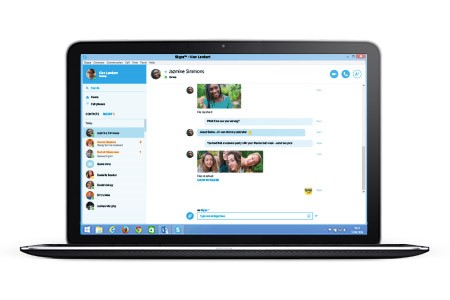Skype For Web Beta Coming, Half-Baked For Chromebooks
Skype for Web is now in beta, and bringing all of the desktop application's capabilities to your favorite web browser. Skype for Web will work on Internet Explorer 10 and up, as well as the latest versions of Chrome (on Windows), Firefox, and Safari 6 (and newer). All you'll need to do to enable Skype capabilities in your browser is log in to Skype.com and install a "small plug-in."
One platform that is glaringly absent from the above list is the Chrome OS version of the Chrome web browser. To put it bluntly, that's a bummer, because one of the features missing from Chromebooks is Skype capabilities (yeah, we know, you can do Google Hangouts), and as Chrome OS is built specifically to take advantage of web-based products and tools, "Skype for Web" would seem to be perfect for it.
The question here is why Chrome OS was snubbed, and although it's tempting to connect the dots -- Microsoft owns Skype, Chromebooks are pounding Windows PC market share -- the reality is that Microsoft is actively working toward a plug-in-free Skype future, which ostensibly would allow Chromebooks to run Skype for Web, too.
Microsoft and Google, actually, are both involved in the W3C ORTC Community Group, which is developing the Object Real-Time Communications (ORTC) API for WebRTC to enable communications on web browsers without the need for a plug-in. (See previous coverage.) Although at this point it seems that the group is working primarily with Internet Explorer, the fact that Google is on board should indicate that this isn't merely a Microsoft joint, as it were.
So what of Chromebook functionality for the time being? Mary Jo Foley wrote that Chromebooks will indeed be able to use Skype for Web's IM capabilities, but there's not yet a plug-in for voice and video calls on the Chrome OS browser. That's (sort of) good news for Chromebook users.
In a blog post, Skype's Jonathan Watson said that the Skype for Web beta will be rolling out to a "small number of existing and new users" at first, with wider availability coming within months. If you get tapped to participate, you'll get a notice when you log in to your account on Skype.com.
As you might expect, though, there are already known issues with the beta; on Macs, running Skype for Web apparently drags on the battery too much, and on all browsers, outgoing calls seem to be slower to connect than through the desktop application.
Get Tom's Hardware's best news and in-depth reviews, straight to your inbox.
We've reached out to Skype for additional clarification regarding Chromebook functionality.
Follow Seth Colaner @SethColaner. Follow us @tomshardware, on Facebook and on Google+.
Seth Colaner previously served as News Director at Tom's Hardware. He covered technology news, focusing on keyboards, virtual reality, and wearables.
-
js_72 Who cares, nobody is using Chromebooks. Why waste time on the 0.001%?Reply
Btw, I have yet to see a chromebook out in the wild -
r3dl1n3 The funniest quote in the above article was "Chromebooks are pounding Windows PC market share"Reply
Really? I laughed so hard I almost fell out of my chair. Thanks for the laugh
-
tman247 Well, lots are using Chromebooks actually. I'm typing this on one for a start. They actually do what they do extremely well, and I've see plenty 'in the wild'.Reply
It's still early days for ChromeOS, but Chromebooks *are* trouncing all over WIndows sales, especially in the education sector. Schools love them. They're affordable, secure, and as most things are now web based, perfectly suited to the task in hand. -
kapitalistas ReplyWell, lots are using Chromebooks actually. I'm typing this on one for a start. They actually do what they do extremely well, and I've see plenty 'in the wild'.
i wanna see how students read books from CD on your chromeee.no offence im just saying.
It's still early days for ChromeOS, but Chromebooks *are* trouncing all over WIndows sales, especially in the education sector. Schools love them. They're affordable, secure, and as most things are now web based, perfectly suited to the task in hand.
-
alextheblue ReplyIt's still early days for ChromeOS, but Chromebooks *are* trouncing all over WIndows sales, especially in the education sector. Schools love them. They're affordable, secure, and as most things are now web based, perfectly suited to the task in hand.
Hey you're RIGHT! Schools always did have horrible, horrible taste in computers. Never once did I ever sit down in front of a school computer that wasn't junk. Best of all they probably paid a hefty premium above retail price, as usual.
-
Steve Simons The school I manage technology for (started last month) has well over 100 chrome books. We are doubling our number in the coming month. Other schools in our district (the largest in MN) are doing the same or more. They are definitely out in the wild. There is a simple beauty in the Chrome Book, even with its limitations. Obviously the best aspect is its price.Reply -
Steve Simons Alextheblue, the school I work at runs a mix of Chrome Books, year-old i5 imacs, and macbook airs. Though I'm not a huge fan of managing Apple (I'd prefer PCs 9 times out of 10), I would not categorize any of those machines as junk.Reply
It is quite difficult to manage cost vs. student access. With set budget dollars, the push is to always maximize the quantity of machines even if it is as a detriment to overall quality. -
falchard I am pretty sure it would be Google snubbing Microsoft in this case. One thing Microsoft does well is port their products to many platforms even if it would be a detriment to their own services. This gives Microsoft a firmer foothold in the market that even if one pillar falls they still have things to fall back on. It maintains Microsoft's dominance in user base. It increases revenue.Reply
Look at Microsoft Office. Despite it making other OSes more viable in the workplace, they still offer it on Mac and Linux because it generates 5% more revenue on the product.
On the other hand Google has been rather closed when it comes to offering competitors access to their android and chrome platforms. Google knows that Microsoft's flexibility and privacy put Google in a bad light while strengthening Microsoft's position. It only makes sense for Google to prevent Microsoft from taking such actions. -
rob8129 I'm a tech in a school district that has over 1200 chromebooks (with a ton more on the way) and I have to say that our instructional staff has really taken to these devices. I think the main factors are that they do what they are supposed to do very well and the tie in to Google Apps for Education is very instrumental to their use. I have started to see a big shift in the use of Gmail and Google Docs/Drive in place of our email and MS Office suite. These units work well for the education sector and are much simpler to admin than a traditional PC. In fact, when our state did a test run of our SBAC testing, all I did was spend 30 sections making the SBAC chrome app a kiosk app in the Google Apps admin panel and all of our CBs had it on the next reboot. It took our techs a ton of work hours getting the PCs ready to run the SBAC program. I'm tired of hearing people bash CBs, if you want to play high end games, get a high end desktop/laptop, if you want to run Abode Premier, do the same. For basic web, email and doc creation, you cannot beat the bang for the buck. For us education IT guys, these things are a cost effective and efficient way to get computing access to our students. Again, if you don't like CBs, don't use them, but don't bash something you don't completely understand.Reply



